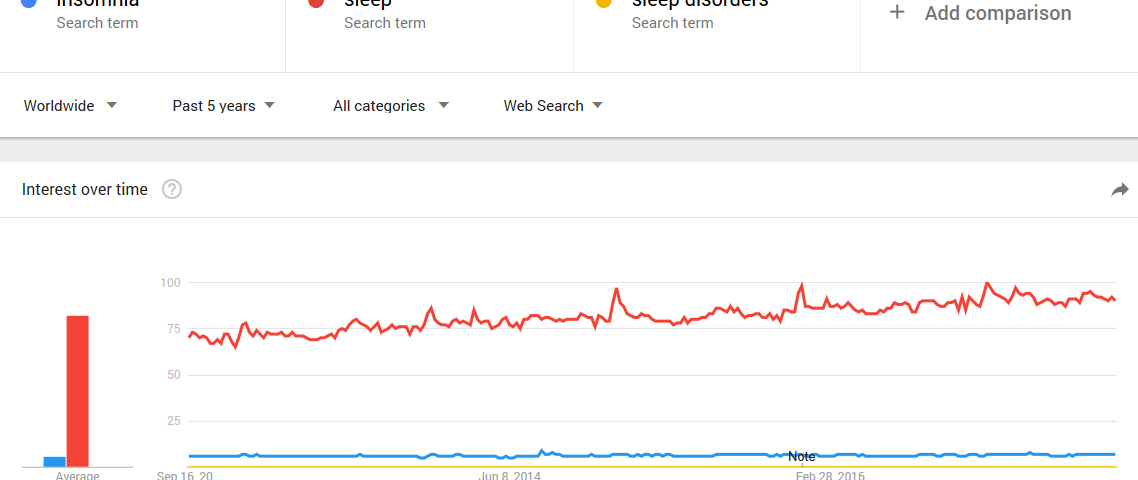Insomnia Statistics 2017-2018
Insomnia may contribute to a significant amount of deaths throughout the world. The reason this statement is potentially accurate is that 100,000 people die each year in US hospitals as a result of medical errors, and that lack of sleep is a contributor to such errors. Insomnia affects around 30% of US adults, with 10% of adults suffering from chronic insomnia. 37% of people aged 20 to 39 report some degree of short sleep duration, and 40% of people aged 40 to 59 report the same. Overall, 35% of adults report receiving fewer than 7 hours of sleep within a normal 24-hour interval.
In what might come as somewhat of a surprise, insomnia can run in families, as around 35% of people suffering from insomnia report a family history of some form of chronic or temporary sleeplessness. It’s not clear to what extent this is a situation where people are genetically predisposed to insomnia, or whether the people are predisposed to other illnesses that are linked with or cause insomnia.
It’s well known that certain kinds of illnesses have a genetic component, and it’s also fairly well established that certain illnesses tend to go hand in hand with insomnia. For example, recent research has shown that around 90% of depressed people also suffer from insomnia. So it’s not entirely clear whether the reason insomnia can seem to run in families is because of a direct genetic link to insomnia, or because of genetic predisposition to illnesses that often times have insomnia as a symptom.
Interestingly, insomnia seems to be influenced to some extent by geography. A study in 2014 examined incidence of adults reporting short sleep duration, defined as getting less than seven hours of sleep over a typical 24-hour period, broken down by US state, county, congressional district, and a number of other geographic breakouts. The highest percentage figures tended to be in the southeast region of the United States, as well as states around the Appalachian Mountains. Conversely, the lowest percentage figures tended to be found in the Great Plains states.
On an individual state basis, the states reporting the lowest percentages were Colorado, Minnesota, South Dakota, Washington and Oregon. States reporting the highest percentages were Hawaii, Kentucky, Alabama, Georgia and West Virginia. There did not seem to be a strong correlation between urban or rural living and insomnia, based on the by-county insomnia data.
Insomnia can be a costly proposition. Not only is insomnia unhealthy, but it costs industry and government billions of dollars every year. First of all, estimated hundreds of billions of dollars per year are spent each year on medical expenses directly related to treating sleep disorders like insomnia.
But the cost of insomnia goes beyond direct costs. It’s estimated that 100,000 car accidents happen each year due to drowsy driving. Around 1,500 people die annually due to those collisions. Furthermore, employers tend to spend around $3200 more in employee health care costs on workers with sleep problems than on those whose sleep is untroubled. All told, insomnia costs the US Government upwards of $15 billion each year in health care, and costs US industry around $150 billion as a result of the lack of productivity and negative actions of sleep deprived workers.
Over the long run, we’re all reasonably likely to deal with insomnia. Studies show that one out of three people will deal with insomnia in some form at any point in their lives. At any given time, between 20 to 40% of adults are currently suffering from insomnia. And over 70 million Americans are dealing with some kind of sleep disorder or wakefulness issue, with 60% of the 70 million having a chronic disorder.
Insomnia can even be bad for your waistline. Studies show that lacking quality sleep can trigger abnormally strong desire for sugary or fatty treats during the course of the day. And this isn’t even confined to people suffering from extreme sleep deficit: Even people getting slightly less than six hours of sleep are vulnerable to this.
Hunger is caused by a combination of two hormones, leptin and ghrelin. Ghrelin alerts the body to hunger, and leptin tells the body when it’s feeling full. Insomnia or lack of sleep can produce an excess of Ghrelin and a decrease in leptin, meaning that your body can be tricked into believing that you’re hungrier than you really are and won’t signal as strongly when you’re full.
This issue doesn’t only apply to adults, as children and teens not getting enough sleep are at greater risk of becoming obese or overweight. This is especially worrisome because childhood or early life obesity often leads to a cascade of health problems later in life.
